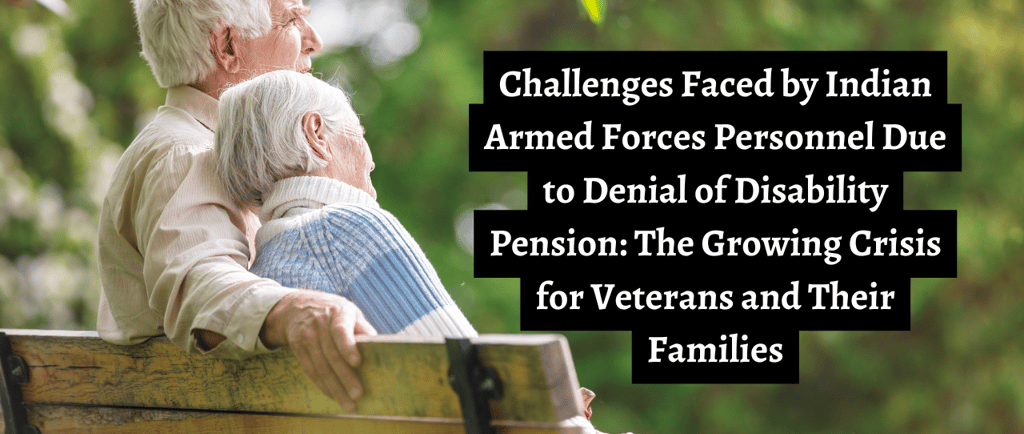Challenges Faced by Indian Armed Forces Personnel Due to Denial of Disability Pension: The Growing Crisis for Veterans and Their Families


Challenges Faced by Indian Armed Forces Personnel Due to Denial of Disability Pension: The Growing Crisis for Veterans and Their Families
The Indian Armed Forces represent one of the most disciplined, resilient, and skilled military forces in the world. Every year, thousands of men and women risk their lives, enduring challenging environments and life-threatening conditions. However, an increasing number of these soldiers, particularly those who sustain injuries or health conditions as a result of service, face an unexpected and distressing reality upon retirement: the denial of a disability pension. This denial not only places a heavy burden on these veterans but also deeply affects their families, especially in their old age.
Systemic Challenges in Securing Disability Pensions
In the Indian Armed Forces, personnel injured or disabled during service are theoretically eligible for a disability pension. However, securing this pension has proven difficult for many due to systemic issues. Veterans often find themselves having to prove the direct link between their disability and their service—a process that involves medical boards, assessments, and extensive documentation. In many cases, disabilities arising from conditions like extreme weather exposure or mental trauma may not be visibly severe, making it hard to classify them as "service-related." Additionally, complex and rigid classification criteria for disability percentages leave many deserving personnel without pensions if their disability rating falls below a certain threshold.
Financial Hardship for Veterans and Their Families
The denial of disability pensions leads to significant financial hardship. Many Indian soldiers come from modest backgrounds, relying on their service income as the primary source of financial support for their families. When veterans are denied their rightful disability pensions, they are forced to rely on other, often insufficient, sources of income, such as small pensions or jobs in the informal sector. This puts immense pressure on them to remain financially active even when their physical conditions deteriorate, adding stress to both the veteran and their family.
For families, this financial strain means stretching limited resources to cover medical expenses, debts, and even basic necessities. With inflation and healthcare costs rising, many struggle to balance everyday expenses with the costs associated with managing the veteran’s disability.
Emotional and Psychological Toll on Families
For veterans who have given the best years of their lives to serve their country, the denial of a disability pension can feel like a betrayal. The resulting financial insecurity and lack of recognition create feelings of helplessness, frustration, and resentment. These emotional struggles often spill over to affect relationships within the family, causing strain between spouses, children, and even extended family members who may also be providing support.
The psychological toll can be particularly severe for families with young children or elderly parents to care for, as they feel responsible for managing the needs of both generations without adequate support. Family members may be forced to work multiple jobs or forgo educational or professional opportunities in order to take care of their disabled loved one, sacrificing their own dreams and goals in the process.
Impact of Aging on Financial and Healthcare Needs
The consequences of a denied disability pension become even more pronounced as veterans and their families age. Without a stable pension to support them, they face mounting medical bills due to age-related health issues, and their earning potential declines.
Elderly veterans and their families may be unable to afford the regular healthcare required for both disability and age-related conditions, leading to further deterioration of health. Without savings or a disability pension, veterans are left vulnerable to poverty, increasing the risk of neglect or lack of essential services in their old age. This issue is particularly distressing for families who live in rural or semi-urban areas where access to healthcare facilities is limited.
Possible Solutions and the Need for Systemic Reform
Addressing these issues requires systemic changes and a commitment to improving the welfare of veterans in India. Some potential steps to alleviate this problem include:
Simplifying the Process of Obtaining Disability Pensions: Revising the guidelines and simplifying the bureaucratic process for disability assessment and pension approval could reduce delays and make it easier for deserving veterans to access their pensions.
Establishing Support Programs for Families: Families of disabled veterans should receive additional support, whether through medical aid, educational grants, or employment opportunities for family members who may be caregivers.
Raising Awareness and Training Among Medical Boards: Ensuring that medical boards understand the unique challenges of military service, including mental health issues and invisible disabilities, could lead to more accurate assessments and greater empathy toward veterans.
Strengthening Legal Recourse and Advocacy: Allowing veterans to access legal support when appealing pension denials can help them navigate the system more effectively and receive fairer outcomes.
Conclusion
The denial of disability pensions to Indian Armed Forces personnel represents a significant challenge for veterans and their families, especially as they age. For individuals who have devoted their lives to the defense of the nation, it is vital that the country stands by them, providing the support they need in their years of vulnerability. Systemic reforms and a greater commitment to veterans’ welfare can alleviate this crisis and ensure that the promise of care and respect for Indian soldiers is kept, long after their active duty has ended.